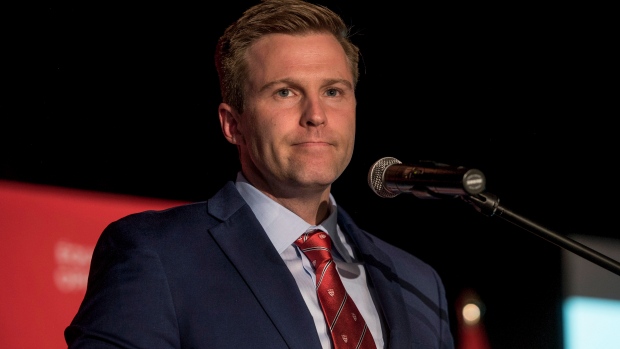Sep 25, 2018
New Brunswick's Gallant to meet with lieutenant-governor as Tories, Liberals vie for power
The Canadian Press

FREDERICTON -- New Brunswick Premier Brian Gallant meets with the province's lieutenant-governor this morning, as he and Tory Leader Blaine Higgs jostle for power after an election that ended in a near dead heat.
After all the votes were counted Monday, the seat count sat at 22 for the Tories, and 21 for the Liberals, with two smaller parties winning three seats each.
Both major-party leaders have late-morning news conferences today -- both at the same time -- but Higgs was to speak in his Quispamsis riding, while Gallant planned to speak in Fredericton after meeting with Lt.-Gov. Jocelyne Roy-Vienneau.
Observers say backroom deals brokered over the coming hours and days could determine whether a tenable coalition is formed with one of the smaller parties -- or whether New Brunswickers are back at the polls before Christmas.
Donald Wright, a political science professor at the University of New Brunswick, says the lieutenant-governor will likely first invite the incumbent, Gallant, to find the confidence of the house.
He says the Liberal leader is likely to approach the Green Party -- which won three seats, including that of leader David Coon -- as they are more "ideologically compatible."
Wright says if Gallant cannot find the confidence of the house, Higgs will be given a chance -- presumably through a deal with the right-of-centre People's Alliance, which also won three seats.
Both Gallant and Higgs indicated in their speeches late Monday that they would seek to govern.
"New Brunswickers ... want us to work collaboratively as political parties to get things done," Gallant said.
"We will be open to do what we can to listen to other political parties and do the best we can on a vote by vote basis."
Higgs, meantime, claimed his party had won a mandate.
"Perhaps Brian Gallant and I will both be lining up at the lieutenant-governor's in the morning," Higgs said.
Wright said if neither main party can gain confidence of the house, the legislature will be dissolved and another election will be held.
Political scientist Mario Levesque said one issue with such a close election is that the party or coalition in power will have to elect a Speaker.
"The challenge here is even if they do form a pact -- the Alliance goes with the Conservatives or the Greens with the Liberals -- there is not enough there to elect the Speaker," said Levesque, a professor at Mount Allison University in Sackville, N.B.
"If the Alliance goes with the Conservatives, that's 25, so a majority," he said. "But then you have to take one away for the Speaker, and that gives them 24 which means they're still vulnerable to a tie vote in the legislature."
Erin Crandall, a professor in the politics department at Acadia University in Wolfville, N.S., called the emergence of two third parties "the big story for this election."
"This is uncharted territory for New Brunswick, which is historically a two-party system," said Crandall, who is originally from Moncton. "It's always been a question of who's going to be in a majority government: The PCs or Liberals."
She said a minority government will change the dynamics of governing in New Brunswick, making third parties the "major influencer" in the legislature.
Crandall said Canadian political parties usually agree to co-operate for a certain period time, without formal coalitions as in other countries.
"In Canada, you usually have one party governing and they rely on the goodwill of these smaller parties," she explained. "Nobody wants an election right away so probably they'll make things work."







